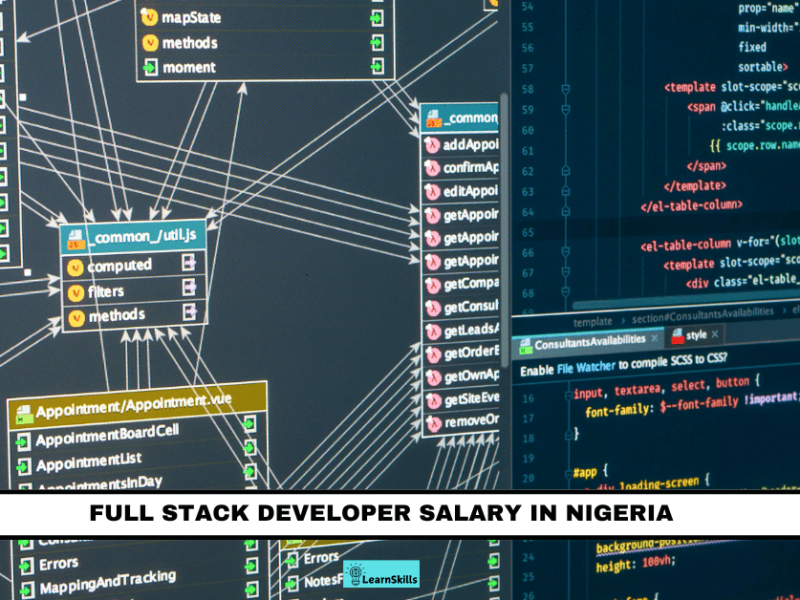If you’re exploring a career in technology, understanding the salary of a full-stack developer in Nigeria is essential. The average monthly pay for a full stack developer in Nigeria is around NGN 418,000. This number can vary based on experience, location, and the tech startup.
As the tech industry grows, skilled professionals are in high demand. Full-stack developers, who can work on both the front and back ends of applications, play a crucial role in this ecosystem.
Knowing the expected salary can help you negotiate better offers and make informed career choices. As you consider a career path, you must stay informed about market trends and salary expectations.
Full-Stack Developer Role in Nigeria
As a full-stack developer in Nigeria, you play a crucial role in the software development industry. Your work covers front-end and back-end development, allowing you to build complete web applications.
Job Description and Expectations
In this role, your primary responsibility is to develop and maintain web applications. You will create user interfaces that are visually appealing and easy to use. This involves using programming languages like HTML, CSS, and JavaScript.
You will work with databases, server-side languages, and APIs on the back end. You should be familiar with frameworks such as Node.js or Django.
Collaborating with designers and other developers is necessary to ensure a smooth workflow. You may also handle project management tasks, ensuring that projects are completed on time and meet client requirements.
Problem-solving skills are essential for troubleshooting issues and implementing new features requested.
Core Skill Set for Nigerian Full Stack Developers
You need a solid mix of technical and soft skills to excel in this role. Here are the core skills you should develop:
- Programming Languages: Proficiency in front-end (HTML, CSS, JavaScript) and back-end languages (Python, Ruby).
- Frameworks: Knowledge of frameworks for both front-end (React, Angular) and back-end (Express.js, Laravel).
- Database Management: Experience with databases like MySQL, PostgreSQL, or MongoDB.
- APIs: Ability to create and integrate RESTful APIs to connect different application parts.
Soft skills like communication and teamwork are also essential. You will work closely with clients and colleagues, so clear communication is key.
Being adaptable and willing to learn new technologies will help you stay competitive in the ever-evolving tech landscape.
Education and Skill Requirements
To become a successful full-stack developer in Nigeria, you need a combination of formal education, practical skills, and relevant certifications. This blend helps you gain the necessary knowledge in programming languages and frameworks.
Formal Education vs. Self-Taught Skills
Many full-stack developers hold a degree in Computer Science or a related field. An undergraduate degree provides a strong foundation in programming concepts and software development. Some may pursue a diploma in software engineering or information technology.
However, self-taught skills are increasingly common. Key programming languages like JavaScript, HTML, and CSS can be learned through online resources.
Building projects and contributing to open-source work can enhance your skills. Many employers value experience just as much as formal education.
Certifications and Online Courses
Earning certifications can boost your job prospects. Various online platforms offer courses designed for full-stack development. Look for programs that cover essential tech skills, including front-end and back-end development.
Popular certifications include those from platforms like Coursera, Udemy, and edX. These courses often focus on practical skills and can enhance your resume.
Completing such certifications shows a commitment to learning and can help you stand out in the job market.
Salary Insights for Full Stack Developers in Nigeria
Full-stack developers in Nigeria can earn varying salaries based on experience, skills, and location. Understanding these differences is essential for anyone considering a career in this field.
Entry-Level vs. Senior Developer Salaries
As an entry-level full-stack developer in Nigeria, you can earn between NGN 250,000 and NGN 400,000 monthly. This range can depend on the technologies you know and the company you join.
If you have more experience, your salary can increase significantly. Senior developers earn between NGN 500,000 and NGN 1,000,000 or more monthly.
Some positions in high-demand tech companies may even offer six-figure salaries in US dollars, reflecting your expertise and the value you bring to projects.
Impact of Experience and Location on Earnings
Your experience level greatly influences your salary. More experienced developers typically command higher pay due to their project management and understanding of complex systems.
Location plays a key role as well. Developers in major cities like Lagos or Abuja often earn more due to higher living costs and demand for tech talent.
Remote roles, especially in international companies, provide competitive salaries beyond local market rates. This can enhance job security and open additional opportunities within the tech landscape of Nigeria.
Technologies and Frameworks
As a full-stack developer in Nigeria, you will work with various technologies and frameworks that are crucial for building web applications. Understanding the backend and frontend tools available can enhance your skills and marketability.
Back-end development with Laravel and Node.js
In backend development, Laravel and Node.js are popular choices. Laravel is a PHP framework, it offers a clean and elegant syntax simplifying tasks like routing, authentication, and database management. You can use MySQL as your database with Laravel for robust data handling.
Node.js, a JavaScript runtime, allows you to build scalable applications. It uses Express as a web framework, enabling you to create RESTful APIs easily. With Node.js, you can handle many connections simultaneously, which is great for real-time applications.
Both Laravel and Node.js support Git for version control, helping you manage code changes effectively.
Frontend Interfaces with AngularJS and Vue.js
On the front-end side, AngularJS and Vue.js are frameworks that make building dynamic user interfaces easier.
AngularJS is developed by Google and is ideal for creating single-page applications. It uses a two-way data binding feature, which means that any changes in the user interface are reflected immediately in the data model.
Vue.js is known for its simplicity and flexibility. It offers a gentle learning curve and allows you to integrate it into existing projects easily. Combining Vue.js with Bootstrap can help you create responsive designs quickly.
Both frameworks provide tools and libraries to enhance user experience and performance, making them essential for full-stack developers in Nigeria.
Securing a Full Stack Developer Position
To secure a full-stack developer position, you need to focus on two main areas: building a solid professional portfolio and understanding the job market in Nigeria. Both aspects are crucial for showcasing your skills and finding the right opportunities.
Building a Professional Portfolio
A strong portfolio is essential. Start by creating production-ready web applications that demonstrate your ability to handle both front-end and back-end tasks.
Use tools like Laravel for backend development to show your expertise. Include projects that highlight your skills in security and privacy. For instance, you could create a web app that focuses on user data protection.
Make sure to display a variety of projects. This can include:
- Simple apps for beginners
- Complex applications that cater to advanced users
Don’t forget to include descriptions of each project, the technologies used, and any challenges you overcame. This will give potential employers a clear view of your capabilities.
Understanding the Job Market
The job market for full-stack developers in Nigeria is growing. Salaries vary based on experience and location. For example, in Lagos, the average monthly salary is around NGN 390,833. This figure can increase based on your skills and the complexity of the projects you undertake.
Stay updated on trends and demands in the industry. Focus on skills that are in high demand, such as knowledge of web frameworks and database management.
Networking can also play a key role in job searches. Engage with fellow developers and potential employers through platforms like LinkedIn. By being proactive in these areas, you can significantly improve your chances of landing a full stack developer role.










